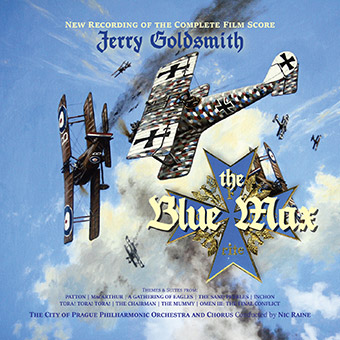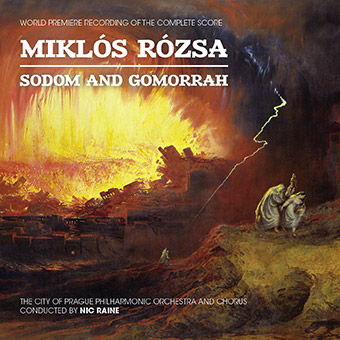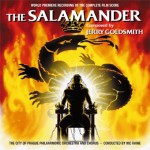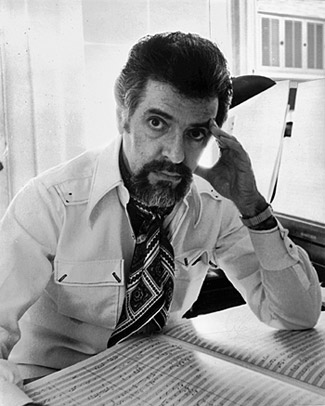Entrevista con Spielberg en 1977. Cito extracto:
INTERVIEW: We were a little dismayed that you were at the new house, because you are Mr. Nice Guy, and we don't have any dish on you, so we wanted to snoop around your place, check out what's on the walls and your record collection.
SPIELBERG: I'll tell you what's in my record collection. Topping the list of records, I have about 760—it changes every week—soundtrack recordings.
INTERVIEW: Stock soundtracks?
SPIELBERG: Three quarters of the records are stock, and the rest are collectors items.
INTERVIEW: Do your soundtracks go back into the '20s or what?
SPIELBERG: You can't go back into the '20s. They didn't begin putting them out until...
INTERVIEW: I mean the talkies.
SPIELBERG: But those are bad reproductions. All the albums I'm interested in getting are the albums that begin in about 1950 when soundtracks became popular.
INTERVIEW: They're so popular now.
SPIELBERG: And they're so rare. I mean certain records—like The Horse Soldiers. I just got a copy of The Horse Soldiers which is a very rare piece of acetate.
INTERVIEW: Are you a John Ford fan?
SPIELBERG: Ah, yes. A major John Ford fan. The score that I want more than anything else—I will trade an original Touch of Evil, one Horse Soldiers, one King of Kings and any early Tiomkin for The Searchers. But I don't think The Searchers was even an album. I think The Searchers is sheet music somewhere in the Warner Bros. Library and you're gonna have to get Elmer Bernstein's Record club or Charles Gerhardt with the London Symphony Orchestra to record this.
INTERVIEW: I should have gotten To Kill a Mockingbird. That's the most beautiful.
SPIELBERG: Oh, I have that! I just got that today, because my secretary knows Elmer Bernstein, and she just came over this morning with a copy of To Kill a Mockingbird. Pretty, isn't it? You know another very pretty thing is Jenny Goldsmith's A Patch of Blue. Max Steiner was probably the best composer for film ever to have lived. The one classical composer who was born to score movies and never did [Bela] Bartok.
INTERVIEW: Well, they weren't around.
SPIELBERG: He was around. Bartok's Symphony for String, Percussion and Cellist was commissioned in 1936. See, [Erich Wolfgang] Korngold could also have become a Bartok or a [Jean] Sibelius, but he went to movies, and he brought a lot of classical music to film. Just like [Sergei] Prokofiev, who scored a number of Russian movies. [Sergei] Eisenstein used Prokofiev.
INTERVIEW: Do you really work closely with your composer?
SPIELBERG: Very closely... I have a great relationship with John Williams.
INTERVIEW: I really liked the Jaws music, sort that "Down to the Sea in Ships" type of thing.
SPIELBERG: Well, John and I sat together and listened to a lot of Vaughn Williams and [Igor] Stravinsky, and then he went off and composed on the piano. Before he orchestrates he asks me to come over. I sit with him, and he plays the entire score on the piano, and I'm able to make comments, changes or whatever right there, which is really a luxury. John called me over to his house very excited. He sat at the piano and said, "Here's the theme from Jaws." He began playing this very primordial, repetition on the lower notes. I thought he was fooling around. I mean "da da Dah da Dah da." I began to laugh, and John said, "Oh, no, this is serious. I mean it. This is Jaws." And I listened to it again and it grew on me. It wasn't something that exploded as a correct choice. At first I thought it was too primitive. I wanted something a little more melodic for the shark, and then Johnny said, "What you don't hear is the L-Shaped Room... You have made yourself a popcorn movie." And he was absolutely right.
http://www.interviewmagazine.com/fil...en-spielberg#_
 ¡Bienvenido a mundodvd! Regístrate ahora y accede a todos los contenidos de la web. El registro es totalmente gratuito y obtendrás muchas ventajas.
¡Bienvenido a mundodvd! Regístrate ahora y accede a todos los contenidos de la web. El registro es totalmente gratuito y obtendrás muchas ventajas.


 LinkBack URL
LinkBack URL About LinkBacks
About LinkBacks

 Citar
Citar














